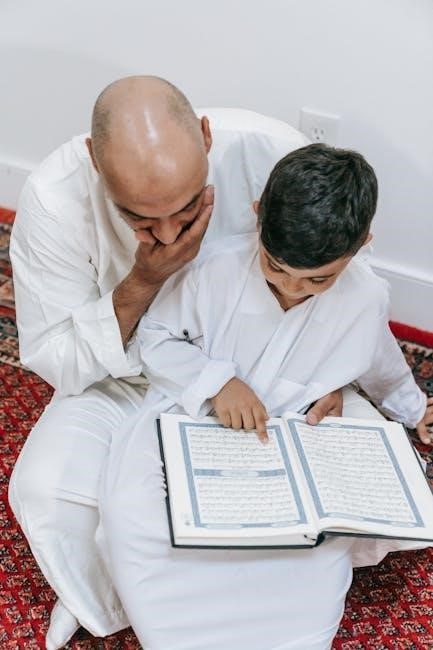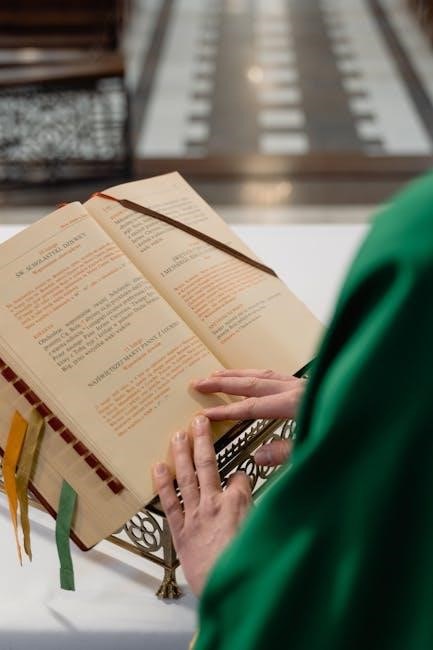
The Book of Ruth offers profound spiritual lessons‚ highlighting faith‚ loyalty‚ and God’s providence. It illustrates how divine love transcends cultures‚ reminding us of His universal redemption plan.

Historical and Cultural Context of the Book of Ruth
The Book of Ruth is set during Israel’s Judges period‚ a time of spiritual and social instability. It highlights the journey from Bethlehem to Moab‚ reflecting ancient Near Eastern customs and the role of women in society.
The Setting: Israel During the Time of the Judges
The Book of Ruth unfolds during the era of the Judges‚ a period marked by recurring cycles of sin‚ repentance‚ and deliverance. This time in Israel’s history lacked strong central leadership‚ leading to moral and spiritual decay. The story begins in Bethlehem‚ a city symbolic of God’s promise‚ but the land faces famine‚ reflecting divine judgment. The narrative highlights the societal instability and the need for redemption‚ setting the stage for the prophetic and redemptive themes that emerge through Ruth and Boaz’s story.
The Significance of Naomi’s Journey from Bethlehem to Moab
Naomi’s journey from Bethlehem to Moab symbolizes a spiritual departure from God’s promises to a life of uncertainty. Driven by famine‚ her family sought refuge in Moab‚ a place outside the covenant‚ reflecting spiritual drifting. Tragedy strikes as Naomi loses her husband and sons‚ leaving her a widow in a foreign land. Her return to Bethlehem‚ though marked by bitterness‚ signifies a turning point. Naomi’s story teaches about the consequences of stepping away from faith and the possibility of restoration. Her journey mirrors the human experience of spiritual wandering and the divine invitation to return to God’s grace‚ highlighting themes of loss‚ repentance‚ and ultimate redemption through her daughter-in-law Ruth’s unwavering loyalty.

Key Figures in the Book of Ruth and Their Spiritual Significance
Naomi‚ Ruth‚ and Boaz embody spiritual truths. Naomi’s journey reflects redemption from bitterness to joy. Ruth models loyalty and faith‚ while Boaz symbolizes divine redemption and grace.
Naomi: A Journey from Bitterness to Joy in the Lord
Naomi’s story is a powerful metaphor of spiritual transformation. Initially overwhelmed by loss and bitterness‚ she returns to Bethlehem‚ symbolizing a return to faith. Her journey mirrors the human experience of facing adversity and finding redemption. Through her interactions with Ruth‚ Naomi learns to trust God again‚ showcasing the process of healing and restoration. Her transformation from bitterness to joy highlights God’s faithfulness in turning sorrow into gladness. Naomi’s life teaches that even in darkness‚ divine providence works to restore hope and bring believers back to a place of spiritual wholeness and joy in the Lord.
Ruth: A Model of Loyalty‚ Faith‚ and Commitment
Ruth’s story is a testament to unwavering loyalty‚ faith‚ and commitment. As a Gentile‚ she chose to leave her homeland and embrace Naomi’s God‚ demonstrating extraordinary devotion. Her famous pledge to Naomi‚ “Where you go‚ I will go‚” reflects her unconditional loyalty and trust in God’s plan. Ruth’s faith transcended cultural boundaries‚ showing how God’s love extends to all nations. Her commitment to Naomi and her newfound faith highlights the power of selfless love and perseverance. Through her actions‚ Ruth exemplifies how faith leads to redemption and blessings‚ not just for herself but for generations to come. Her life serves as a timeless model of what it means to trust God wholeheartedly and remain steadfast in commitment‚ even in challenging circumstances.

Boaz: The Kinsman Redeemer and His Typological Representation of Christ
Boaz‚ as the kinsman redeemer‚ embodies Christ-like qualities‚ offering redemption and restoration. His role in redeeming Naomi’s land and marrying Ruth mirrors Christ’s redemption of humanity. Boaz’s kindness‚ generosity‚ and adherence to tradition reflect God’s covenant faithfulness. His willingness to take Ruth‚ a foreigner‚ into his family foreshadows Christ’s inclusion of Gentiles in God’s plan. Boaz’s actions demonstrate divine love‚ highlighting God’s universal redemption plan through Christ. This typological connection underscores the Book of Ruth’s deeper spiritual significance‚ showing how God’s redemptive plan extends beyond Israel to all nations‚ ultimately fulfilled in Christ. Boaz’s character serves as a profound reminder of God’s grace and redemption‚ available to all through faith in Jesus Christ.

Major Spiritual Lessons from the Book of Ruth
The Book of Ruth teaches faith‚ trust in God’s plan‚ unconditional love‚ and commitment. It highlights redemption‚ divine providence‚ and the universal reach of God’s grace and blessing.
The Power of Faith and Trust in God’s Providence
The Book of Ruth beautifully illustrates the power of faith and trust in God’s providence. Naomi’s journey from bitterness to joy exemplifies how trust in God can transform lives. Despite facing loss and hardship‚ Naomi ultimately recognizes God’s sovereignty‚ showing that faith can lead to restoration. Ruth’s unwavering commitment to Naomi and her God demonstrates how trust in divine providence fosters loyalty and obedience. Boaz’s role as a kinsman redeemer highlights God’s faithfulness in providing for His people‚ even in unexpected ways. Together‚ their stories teach believers to trust God’s plan‚ even in uncertain circumstances‚ and to rely on His provision. This lesson encourages believers to embrace faith as a cornerstone of their spiritual journey‚ knowing that God’s love and care are always at work.
The Importance of Love‚ Commitment‚ and Relationship
The Book of Ruth underscores the transformative power of love‚ commitment‚ and relationship. Ruth’s loyalty to Naomi‚ despite cultural and personal challenges‚ exemplifies unconditional love and dedication. Naomi’s journey from bitterness to joy highlights the redemptive power of relational bonds. Boaz’s kindness and commitment to Ruth and Naomi demonstrate how acts of love can restore hope and dignity. The story emphasizes that relationships are a sacred space where God’s love is expressed. Ruth’s decision to remain with Naomi‚ even when given the freedom to leave‚ reflects the depth of commitment rooted in love. This teaches believers the value of prioritizing relationships and loving others selflessly‚ mirroring God’s love for humanity. The Book of Ruth reminds us that love and commitment are essential for building strong‚ God-honoring relationships in our lives.
God’s Redemption Plan and the Role of the Kinsman Redeemer
The Book of Ruth beautifully illustrates God’s redemption plan through the role of the kinsman redeemer‚ a figure who restores and redeems. Boaz‚ as the kinsman redeemer‚ represents Christ‚ who redeems humanity from sin. Boaz’s actions—redeeming Naomi’s land and marrying Ruth—symbolize Christ’s redemption of believers. Ruth‚ a Gentile‚ becomes part of the lineage of David and ultimately Jesus‚ showing God’s plan to include all nations in His redemption. The story highlights God’s faithfulness and love‚ demonstrating how He weaves individual lives into His larger plan. The kinsman redeemer typology points to Jesus as the ultimate Redeemer‚ who restores humanity’s relationship with God. This theme underscores the universal nature of God’s redemption‚ transcending cultural and ethnic boundaries‚ and offers hope for all people.
The Universal Nature of God’s Love and Blessing
The Book of Ruth vividly demonstrates the universal nature of God’s love‚ transcending cultural and ethnic boundaries. Ruth‚ a Moabite‚ exemplifies how God’s blessings extend beyond Israel to include Gentiles. Despite her foreign background‚ Ruth’s faith and loyalty lead to her inclusion in the family of God‚ ultimately becoming part of the lineage of King David and Jesus Christ. This highlights God’s plan to bless all nations through His redemption. The story shows that God’s love is not confined to a specific people but is available to all who trust Him. Ruth’s journey from a foreigner to a beloved daughter of God teaches believers today to embrace diversity and recognize that His love knows no borders. This universal blessing reflects God’s heart for all humanity‚ affirming His desire to unite people from every background through His grace and redemption.

Personal Application of the Spiritual Lessons
The Book of Ruth teaches us to trust God in challenging circumstances‚ remain loyal‚ and demonstrate unconditional love in our relationships‚ reflecting His faithfulness in our lives.
How to Cultivate Faith and Trust in Challenging Circumstances
The Book of Ruth provides practical insights into building faith and trust during hardships. Like Naomi and Ruth‚ we can learn to rely on God’s sovereignty even when circumstances seem dire. Prayer and seeking divine guidance are essential‚ as seen in Ruth’s decision to remain loyal despite uncertainty. Trusting God’s providence involves surrendering our will to His plan‚ even when the path is unclear. Ruth’s unwavering commitment to Naomi and her faith in God’s promises demonstrate how trust grows through obedience and perseverance. In challenging times‚ reflecting on God’s past faithfulness‚ like Ruth did‚ strengthens our confidence in His future provision. Avoiding the temptation to take matters into our own hands‚ as Naomi initially did‚ is crucial. Instead‚ focusing on God’s love and redemption helps us trust Him more deeply‚ fostering a steadfast faith that endures through life’s trials. This lesson remains timeless for believers today.

Practicing Unconditional Love and Commitment in Relationships
Ruth’s unwavering dedication to Naomi exemplifies unconditional love and commitment. Her famous vow in Ruth 1:16-17 reflects a selfless love that transcends cultural and familial boundaries. This teaches us to prioritize others’ well-being and remain steadfast in relationships‚ even during hardships. Naomi’s transformation from bitterness to joy also highlights the power of love and forgiveness. Boaz’s kindness towards Ruth demonstrates how unconditional love can be shown through actions‚ such as providing for others and honoring their dignity. These examples encourage us to embrace humility and compassion in our interactions. By imitating Ruth’s loyalty and Boaz’s generosity‚ we can build stronger‚ Christ-like relationships. The Book of Ruth reminds us that true love and commitment are not conditional but rooted in faith and a willingness to serve others selflessly‚ reflecting God’s unconditional love for humanity.
The Book of Ruth remains a timeless treasure‚ offering spiritual lessons that resonate across generations. Its themes of faith‚ loyalty‚ and redemption remind us of God’s enduring love and providence. Ruth’s journey from a foreign widow to a cherished ancestor of King David reflects God’s universal grace‚ available to all people. The story’s emphasis on relationships‚ trust‚ and commitment inspires believers to live selflessly and rely on God’s sovereignty. Boaz’s role as a kinsman redeemer foreshadows Christ’s ultimate redemption‚ underscoring the Bible’s cohesive plan of salvation. This small book’s profound truths encourage us to embrace unconditional love‚ steadfast faith‚ and humility in our lives. Through Ruth’s story‚ we are reminded that God weaves even the most ordinary lives into His extraordinary plan‚ making the Book of Ruth a timeless guide for spiritual growth and inspiration.